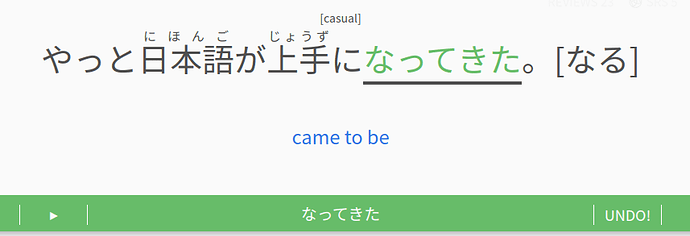@nekoyama & @FredKore: OK, thanks for both of your explanations.
“クリスマスが近づいてきたから、子供たちが色々なものを欲しいと言っている。”
In this example sentence, I don’t understand the conjugation of 「近づく」. Why does it become [近づい」? I’m not sure where to read about this specifically. It’s hard to know where a verb might conjugate like this because I don’t really recognize it as a “thing” and don’t know where to see more examples.
近づいて is the て-form of 近づく. That’s what the て in the grammar point is for, て-form of a verb + くる.
…maybe the explanation could be a bit more clear than “attach て to any verb”. Did you read it as “attach the kana て” (rather than the particle)?
What I didn’t understand is where to find an explanation of why " 近づいて is the [て-form] of 近づく" so that settles that thanks. I remember 歩いて so now I see it’s the same kinda thing.
Often times there a lot of little idiosyncrasies or rarer things that come up in these reviews that or they’re examples of stuff that hasn’t been explained yet in the lessons I’ve done, and the sentences suddenly get a lot longer and more complicated from the previous reviews so sometimes I can’t really figure out how to look up what exactly I’m looking for when I see a review solution being what it is and had no clue.
なった would be “become”, but the sentence is wanting “came to be”.
I finally became good at Japanese.
vs
I finally came to be good at Japanese.
Thank you so much @severian !
But, oh, blimey, my English is getting worse and worse, let alone learning Japanese! I can’t see any difference between those two sentences in terms of meaning!
Let me go away and think about that one, because I just don’t feel like I have the brain-power right now! Thanks again so much!
If I wanted to express a negative (i.e. something did not occur) would I use the negative て form or negative of くる?
For example:
昨日雪が降りすぎたので、家を出なくてきた。
Because it snowed so much yesterday, I was unable to leave the house. (Perhaps this isn’t even an acceptable usage of the grammar structure)
I don’t see examples of negatives used in the lesson.
This technically isn’t about てくる but rather about ていた, but something has been bothering me about a review sentence on this topic:
ニュースではずっと雨が降ると言っていたけど、晴れてきた
It’s translated as “The news said that it was going…” but wouldn’t it be more accurate to translate it as “The news was saying that it was going…”. Or is the ていた here some sort of conjunctive form?
Splitting hairs perhaps but what am I if not a pedant :D.
Welcome to the community 
The 言っていた has the added nuance that implies you were there when it was being said. Sounds perfectly fine in Japanese here, and I suppose the English could go either way, but honestly I think it gets the point across fine. But you can always report a translation suggestion next time you see that sentence.
And its just a past form of the continuous, not a conjunction
Thanks!
Do you mean the added nuance of と言っていた is there compared to と言った?
And yeah there indeed isn’t a great deal of nuance difference in English either way but I thought I’d ask for accuracy’s sake.
Thanks for clarifying things!
This graphic is insanely helpful. I was pulling my hair out over ていく and てくる before I saw this. Now it makes so much sense. The short translations under the grammar point in Bunpro associated both with “start” which…
Having trouble understanding this one sentence, wanting to make sure I understand correctly.
朝から家の掃除をしているので、家が綺麗になってきています。Since I’ve been cleaning the house from this morning, the house is becoming cleaner.
Am I right that thinking 家が綺麗になってきました。would be “the house became cleaner” and 家が綺麗になってきます。would be “the house becomes clean”? Does that last one even make sense?
I am trying to understand what nuance the additional ている lends here in the original sentence.

